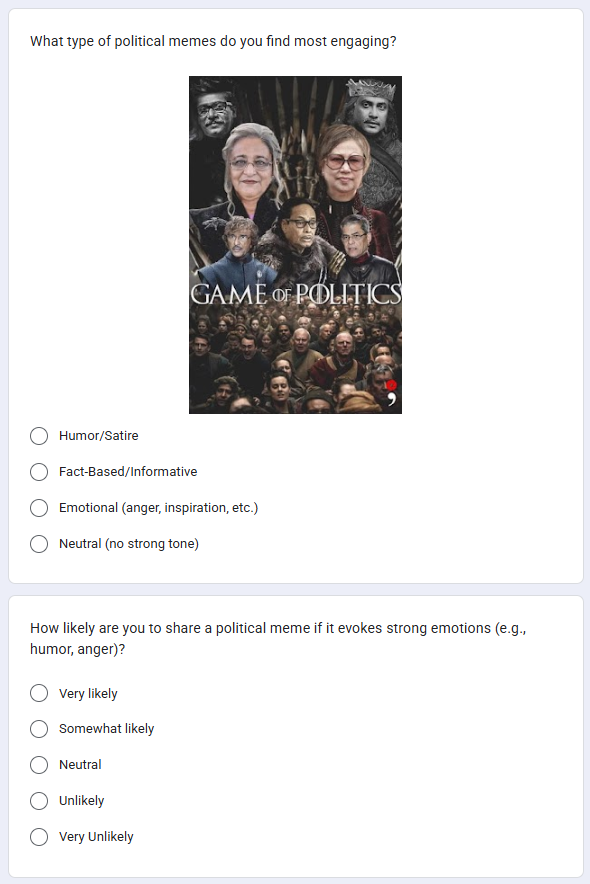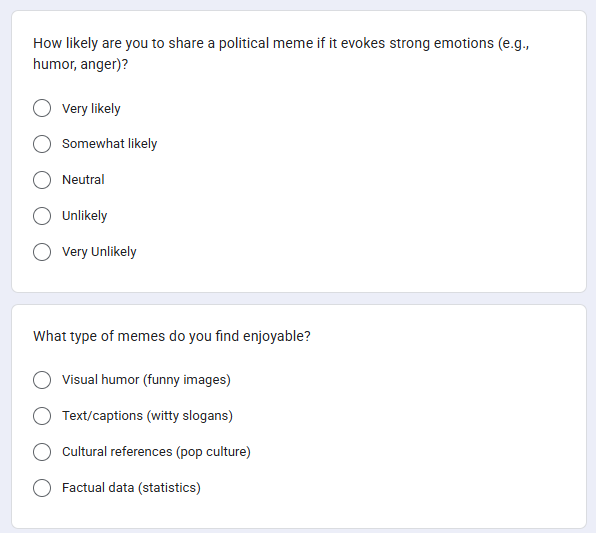The Role of Memes in Political Communication: How Humor and Virality Shape Public Opinion
In the age of social media, political discourse has expanded beyond traditional news outlets, debates, and campaign speeches. “Memes” —often humorous, relatable, and highly shareable digital content—have become a dominant force in shaping public opinion, influencing discussions, and even mobilizing political participation. But just how much influence do these digital snippets really have? Can they change perceptions, drive voter engagement, or even mislead the public?
This research, conducted by Mahtab, Sadman, Ibrahim, Rezanur, Samit, and Asraful, seeks to explore the growing role of memes in political communication. Through this study, we aim to understand how political memes affect people’s engagement, trust in political messaging, and overall influence on public discourse.
Why Are Political Memes Important?
Political memes serve as a powerful form of digital communication that:
✅ Simplifies complex political issues, making them more accessible to a wider audience.
✅ Encourages engagement, sparking discussions, activism, and even influencing voter behavior.
✅ Shapes public perception, reinforcing political narratives, stereotypes, or challenging mainstream viewpoints.
✅ Spreads misinformation, as memes can sometimes distort facts or be used for political propaganda.
With their ability to go viral within seconds, political memes have become a crucial tool in modern political strategy, making it important to study their impact.
About This Research
This study, conducted by Mahtab, Sadman, Ibrahim, Rezanur, Somit, and Asraful, focuses on how different demographics interact with political memes, which types of content are most engaging, and whether memes influence political beliefs and decisions. Key areas of exploration include:
🔹 Social Media & Meme Consumption – Who engages with political memes the most? Which platforms are the primary sources of political content?
🔹 Meme Engagement & Sharing Behavior – What types of political memes (humorous, factual, emotional, or neutral) resonate the most? Are people more likely to share a meme that evokes strong emotions like humor, anger, or inspiration?
🔹 Influence on Political Opinions – Can a meme actually change someone’s perspective on a politician or policy? Are humor-based memes more persuasive than fact-based ones?
🔹 Misinformation & Ethical Concerns – How often do people encounter misleading information in political memes? Should political campaigns use memes as a primary communication tool?
🔹 Comparison to Traditional Political Advertising – Are memes more effective than traditional political ads, banners, or campaign strategies?
Why Your Participation Matters
The rise of political memes signals a major shift in how people consume and engage with political content. Your responses to this survey will help us:
✔ Understand the real impact of memes in shaping public opinion.
✔ Evaluate whether memes are a reliable source of political information or a tool for misinformation.
✔ Provide insights into how memes can be used effectively (or dangerously) in political communication.
By participating in this survey, you contribute to an important discussion on the future of digital political engagement. Join us in uncovering the power of memes in modern politics!
🚀 Take the Survey Now & Share Your Thoughts!








Leave a Reply